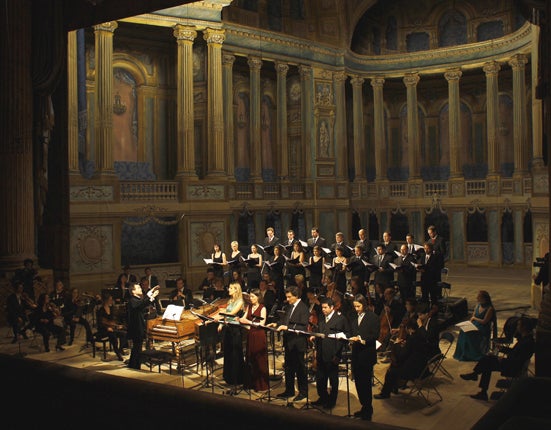Bellérophon, Opéra Royal, Versailles

As Britain succumbed to pantos and Nutcrackers, an arcane but significant cultural event was one of the hottest tickets in France. The little known baroque opera Bellérophon, a favourite of Louis XIV, returned to Paris for the first time since the 18th century and was put on in concert version in the newly restored Opéra Royal, the theatre in the palace of Versailles. It was premiered before Louis XIV in Paris in 1679.
It is little surprise that the work, composed by Jean-Baptiste Lully, endeared itself to the king. The mythical story of a fearless hero whose arrogance is punished by the gods was none too subtly changed by Lully to show a hero who practises restraint and moderation to the foes he vanquishes – a reference to the Sun King's recent victory over the Dutch, the Spanish and the Holy Roman Emperor.
Lully, who was in charge of all royal music by the age of 30, was an intimate of the king, and in one comedie-ballet that Lully collaborated on with Molière, Louis IV, who took as his emblem Apollo, appeared as the god, wearing a golden corset and kilt fashioned into rays of sun that gave rise to his being known as the Sun King.
In Bellérophon, the hero is a slayer of monsters, and the work is full of them, and full of dances and heroic battles. So it was frustrating to see it only in concert version. The opera is clearly both dramatic and tuneful, and the cast highly talented, particularly the high tenor Cyril Auvity in the title role and the soprano Céline Scheen. The opera has been brought back by Christophe Rousset, a champion of the composer, and his ensemble Les Talens Lyriques. A special mention must be made of the percussionist Marie-Ange Petit, something of a star in early music circles, who added colour to the music with some instruments it would be hard to name. She makes some of her own instruments from original models as well as using 17th-century drums.
But, the greatest joy of the evening was a sense of place. To sit in the Sun King's palace and behold the all-wooden original theatre and opera house, rarely used now for public performance, was to be part of an occasion with a sense of history that transcended the work on stage.
Join our commenting forum
Join thought-provoking conversations, follow other Independent readers and see their replies
Comments
Bookmark popover
Removed from bookmarks